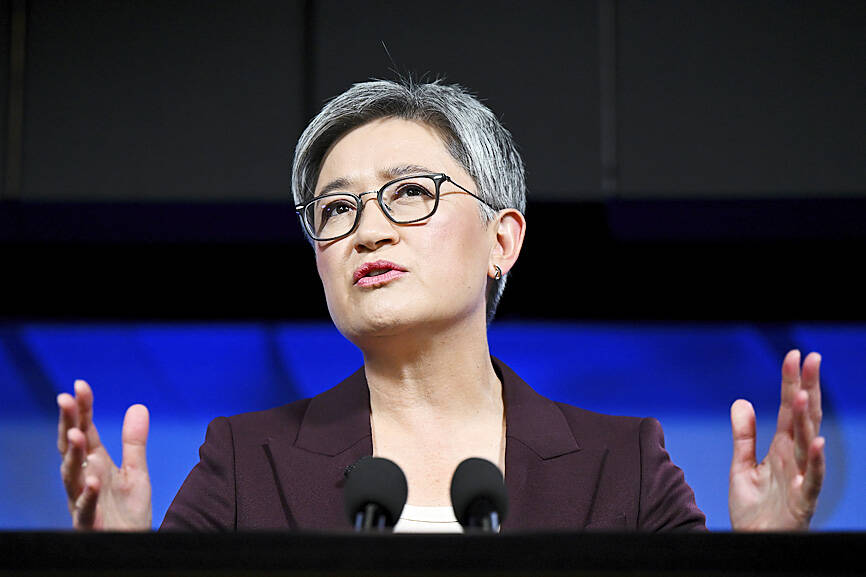Australia is working to stabilize relations with China, but could not return to the thriving economic relationship with its biggest trading partner that existed 15 years ago, Australian Minister of Foreign Affairs Penny Wong (黃英賢) said yesterday.
Icy bilateral relations that deteriorated during the previous conservative Australian government’s nine years in power have shown signs of improvement since Wong’s Labor Party was elected almost a year earlier. Minister-to-minister meetings have resumed, China has recently lifted restrictions on Australian coal imports and Canberra hopes a three-year-old tariff barrier on Australian barley would be lifted within months.
However, Wong said that trade relations could not return to the level when conservative Australian prime minister John Howard was in power from 1996 until 2007. Trade was then separated from political and strategic priorities.

Photo: AP
“I have been very clear that we seek to stabilize the relationship,” Wong told the National Press Club. “I think both countries know we are not going to go back to where we were 15 years ago.”
During Howard’s era, “you could have your strategic relationship with the United States and the economic relationship with China and the worlds stayed separate — we don’t live in that sort of world anymore,” Wong said.
China has imposed a series of official and unofficial trade barriers to Australian exports in the past few years, particularly since the previous government angered Beijing by calling for an independent investigation into the causes of and responses to the COVID-19 pandemic.
While Australian businesses and state leaders were impatient for Chinese barriers to be lifted for exports including wine, wood and seafood, Wong described diversifying to other markets as “a smart thing to do.”
“Even with increased diversification, China will remain Australia’s largest trading partner for the foreseeable future, and a valued source of foreign investment, where it meets our national interests,” she said.
Australia has blocked the sale of assets including critical infrastructure to Chinese companies on national security grounds in recent years.
Canberra is working toward maintaining a predictable, rules-based Asia-Pacific region “where no country dominates and no country is dominated,” Wong said.

DEFENDING DEMOCRACY: Taiwan shares the same values as those that fought in WWII, and nations must unite to halt the expansion of a new authoritarian bloc, Lai said The government yesterday held a commemoration ceremony for Victory in Europe (V-E) Day, joining the rest of the world for the first time to mark the anniversary of the end of World War II in Europe. Taiwan honoring V-E Day signifies “our growing connections with the international community,” President William Lai (賴清德) said at a reception in Taipei on the 80th anniversary of V-E Day. One of the major lessons of World War II is that “authoritarianism and aggression lead only to slaughter, tragedy and greater inequality,” Lai said. Even more importantly, the war also taught people that “those who cherish peace cannot

STEADFAST FRIEND: The bills encourage increased Taiwan-US engagement and address China’s distortion of UN Resolution 2758 to isolate Taiwan internationally The Presidential Office yesterday thanked the US House of Representatives for unanimously passing two Taiwan-related bills highlighting its solid support for Taiwan’s democracy and global participation, and for deepening bilateral relations. One of the bills, the Taiwan Assurance Implementation Act, requires the US Department of State to periodically review its guidelines for engagement with Taiwan, and report to the US Congress on the guidelines and plans to lift self-imposed limitations on US-Taiwan engagement. The other bill is the Taiwan International Solidarity Act, which clarifies that UN Resolution 2758 does not address the issue of the representation of Taiwan or its people in

US Indo-Pacific Commander Admiral Samuel Paparo on Friday expressed concern over the rate at which China is diversifying its military exercises, the Financial Times (FT) reported on Saturday. “The rates of change on the depth and breadth of their exercises is the one non-linear effect that I’ve seen in the last year that wakes me up at night or keeps me up at night,” Paparo was quoted by FT as saying while attending the annual Sedona Forum at the McCain Institute in Arizona. Paparo also expressed concern over the speed with which China was expanding its military. While the US

‘FALLACY’: Xi’s assertions that Taiwan was given to the PRC after WWII confused right and wrong, and were contrary to the facts, the Ministry of Foreign Affairs said The Ministry of Foreign Affairs yesterday called Chinese President Xi Jinping’s (習近平) claim that China historically has sovereignty over Taiwan “deceptive” and “contrary to the facts.” In an article published on Wednesday in the Russian state-run Rossiyskaya Gazeta, Xi said that this year not only marks 80 years since the end of World War II and the founding of the UN, but also “Taiwan’s restoration to China.” “A series of instruments with legal effect under international law, including the Cairo Declaration and the Potsdam Declaration have affirmed China’s sovereignty over Taiwan,” Xi wrote. “The historical and legal fact” of these documents, as well